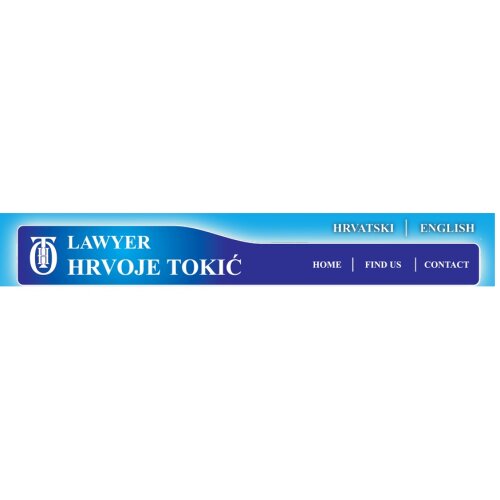Best Nonprofit & Charitable Organizations Lawyers in Croatia
Share your needs with us, get contacted by law firms.
Free. Takes 2 min.
Or refine your search by selecting a city:
List of the best lawyers in Croatia
About Nonprofit & Charitable Organizations Law in Croatia
Nonprofit and charitable organizations in Croatia operate under a legal framework designed to facilitate their establishment, governance, and operational activities. These entities play a crucial role in various sectors, including social services, education, culture, and environmental protection. The Croatian legal system provides for the creation of various forms of nonprofit organizations, including associations, foundations, and funds. Each type is subject to specific regulations regarding their formation, governance, reporting, and taxation.
Why You May Need a Lawyer
Seeking legal advice for nonprofit and charitable organizations in Croatia can be beneficial in several situations, including:
- Establishing a new nonprofit entity and navigating the registration process.
- Ensuring compliance with local and national regulations governing nonprofit operations.
- Drafting or reviewing organizational documents such as bylaws, incorporation documents, and contracts.
- Navigating issues related to tax exemptions and fundraising activities.
- Addressing disputes or conflicts within the organization or with external entities.
- Guidance on mergers, partnerships, or dissolution of a nonprofit.
Local Laws Overview
Several key aspects of Croatian law are particularly relevant to nonprofit and charitable organizations:
- Associations Act: It governs the formation, registration, and operations of associations. It includes guidelines on internal governance, membership, and reporting requirements.
- Foundations and Funds Act: This law pertains to the establishment and management of foundations and funds, specifying fiduciary duties and financial regulations they must adhere to.
- Tax Laws: Nonprofits may benefit from tax exemptions and need to comply with specific financial regulations to maintain their status.
- Labor Law: This law is relevant for organizations employing staff, detailing employee rights and organizational obligations.
Frequently Asked Questions
What types of nonprofit organizations can be established in Croatia?
In Croatia, you can establish associations, foundations, and funds as forms of nonprofit organizations.
What is the process to register a nonprofit organization?
Registration involves preparing necessary documents, including statutes, and submitting them to the competent authority, typically the Ministry of Public Administration.
Are nonprofits in Croatia eligible for tax exemptions?
Yes, registered nonprofit organizations may be eligible for certain tax exemptions, but they must comply with specific financial reporting requirements.
Can a foreigner establish a nonprofit in Croatia?
Yes, foreigners can establish and participate in nonprofit organizations, but it is often advisable to consult with a legal professional for guidance through the process.
What are the reporting requirements for nonprofits?
Nonprofits must file annual financial reports and other necessary documentation to demonstrate compliance with relevant laws.
How are disputes within a nonprofit organization resolved?
Disputes can be resolved through internal mechanisms set out in the organization’s statutes or through legal proceedings if necessary.
What is required for a nonprofit organization to receive funding from foreign sources?
Nonprofits must comply with regulations regarding foreign funding, which may involve reporting to regulatory bodies.
Is it necessary to have a lawyer to dissolve a nonprofit organization?
While not strictly necessary, having a lawyer can ensure the dissolution process complies with legal requirements and minimizes risks.
How can nonprofits engage in commercial activities?
Nonprofits can engage in commercial activities provided these activities align with their mission and profits are reinvested in the organization.
What are the rules regarding governance and management of nonprofits?
Governance rules are primarily set by the organization's statutes, but they must also adhere to legal regulations regarding transparency and accountability.
Additional Resources
Several resources can assist those involved with nonprofit and charitable organizations in Croatia:
- Ministry of Public Administration: For registration and compliance requirements.
- Croatian Union of Associations: Offers support and guidance to associations.
- Tax Administration Office: Provides information on tax obligations and exemptions.
- Local Legal Aid Services: Provide assistance and advice on legal matters for nonprofits.
Next Steps
If you need legal assistance in matters related to nonprofit and charitable organizations in Croatia, consider the following steps:
- Identify the specific legal issue or question you have regarding your organization.
- Seek recommendations for reputable legal professionals or law firms with expertise in nonprofit law.
- Prepare relevant documents and a brief outline of your issue to discuss with a lawyer.
- Schedule a consultation to gain a better understanding of your legal options and obligations.
Lawzana helps you find the best lawyers and law firms in Croatia through a curated and pre-screened list of qualified legal professionals. Our platform offers rankings and detailed profiles of attorneys and law firms, allowing you to compare based on practice areas, including Nonprofit & Charitable Organizations, experience, and client feedback.
Each profile includes a description of the firm's areas of practice, client reviews, team members and partners, year of establishment, spoken languages, office locations, contact information, social media presence, and any published articles or resources. Most firms on our platform speak English and are experienced in both local and international legal matters.
Get a quote from top-rated law firms in Croatia — quickly, securely, and without unnecessary hassle.
Disclaimer:
The information provided on this page is for general informational purposes only and does not constitute legal advice. While we strive to ensure the accuracy and relevance of the content, legal information may change over time, and interpretations of the law can vary. You should always consult with a qualified legal professional for advice specific to your situation.
We disclaim all liability for actions taken or not taken based on the content of this page. If you believe any information is incorrect or outdated, please contact us, and we will review and update it where appropriate.
Browse nonprofit & charitable organizations law firms by city in Croatia
Refine your search by selecting a city.

















